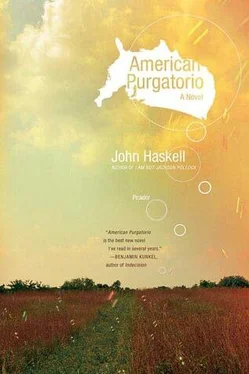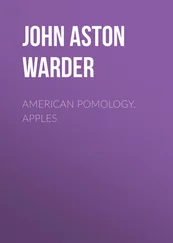John Haskell - American Purgatorio
Здесь есть возможность читать онлайн «John Haskell - American Purgatorio» весь текст электронной книги совершенно бесплатно (целиком полную версию без сокращений). В некоторых случаях можно слушать аудио, скачать через торрент в формате fb2 и присутствует краткое содержание. Год выпуска: 2006, Издательство: Picador, Жанр: Современная проза, на английском языке. Описание произведения, (предисловие) а так же отзывы посетителей доступны на портале библиотеки ЛибКат.
- Название:American Purgatorio
- Автор:
- Издательство:Picador
- Жанр:
- Год:2006
- ISBN:нет данных
- Рейтинг книги:3 / 5. Голосов: 1
-
Избранное:Добавить в избранное
- Отзывы:
-
Ваша оценка:
- 60
- 1
- 2
- 3
- 4
- 5
American Purgatorio: краткое содержание, описание и аннотация
Предлагаем к чтению аннотацию, описание, краткое содержание или предисловие (зависит от того, что написал сам автор книги «American Purgatorio»). Если вы не нашли необходимую информацию о книге — напишите в комментариях, мы постараемся отыскать её.
Los Angeles Times
American Purgatorio — читать онлайн бесплатно полную книгу (весь текст) целиком
Ниже представлен текст книги, разбитый по страницам. Система сохранения места последней прочитанной страницы, позволяет с удобством читать онлайн бесплатно книгу «American Purgatorio», без необходимости каждый раз заново искать на чём Вы остановились. Поставьте закладку, и сможете в любой момент перейти на страницу, на которой закончили чтение.
Интервал:
Закладка:
I try it again, this time with a man, his hair tied back in a ponytail. He walks up a street with vines growing over the sidewalk and I follow him to the corner. While he’s waiting for the light to change I get close to him and look at him and I would speak to him but so many other things are going on. A million things are happening — the cars and the houses and the weeds in the cracks in the sidewalk. When I don’t pay attention to any one of them, in that moment of not paying attention, they seem not to exist. For a moment the man has left my mind, and when I turn back to him he’s already crossing the street. He’s already walking away, getting smaller and smaller and smaller.
I’m trying to fill the time of waiting with something other than waiting, but all I do is wait. I notice, while I’m waiting, the obvious fact of the sun on my skin or the bus-stop bench I’m sitting on, but my concern isn’t the bus-stop bench. My concern is later, the future, and then the future arrives.
I’m sitting at a table with Geoff and Linda, in a crowded Japanese restaurant. I seem to be able to listen, to direct my mind away from the thought of my feet in my shoes, and by listening I seem to be able to keep the world intact. I can hear Geoff talking about picture frames, the existential implications of picture frames. He works at a frame-making shop and he’s talking about how a picture frame, by eliminating the extraneous distractions of the world, imposes order on the world. By focusing attention on a limited field of awareness, even an empty frame on a blank wall causes us to see the wall, and the color of the wall, and the cracks in the plaster, in a way we would never have noticed before. He says that without the frame — he’s talking about the metaphorical frame — the world would turn into chaos. Which is fine for him, because his frame is solid and firm and agreed upon.
My frame, on the other hand, is fading away, which is why, after Linda serves herself from the various dishes of food, I reach over, take the large spoon, and start scooping food onto my empty plate. I want to try everything, I think. Load it on, I think, and I keep filling my plate until the plate is piled with food. I separate my chopsticks, but when I look down at the pyramid of rice and tofu and green pieces of vegetable, although I would like to have even the slightest desire to eat, I don’t. I have the desire for desire, but not desire itself. I can’t even imagine taking a bite, or if I did, that eating food is something I’m capable of doing.
I can hear the background sounds of the restaurant, the voices and the clattering, and I look at my bowl of soup. I squirt some sauce from a plastic container into the soup, but it’s not the soup that’s a problem, it’s me, or something lacking in me, and I try to recall the smell of soup and the enjoyment of that smell, and I imagine that maybe there is a certain flavor. I take an experimental slurp, hoping to taste something, but there’s nothing to taste except in my imagination. I know it’s my imagination, and even my imagination is wavering, like a radio with bad reception. Nothing seems to exist unless I make it exist, so that’s what I do.
Which would be fine except that Linda, at this point, is looking at me, waiting for me to say something. And it’s not that I have nothing to say, but anything I had has already passed away. Not only that, I feel that I am passing away. I want to extricate myself from the sense of this passing and prove that, yes, I exist, but since I can’t think of any logical way to do that, I excuse myself and walk to the bathroom.
I close the door and go, not to a urinal, but to a toilet stall. I sit on the toilet, hoping that something might happen to give me a frame of reference, or bring my current frame of reference back to something manageable and real. I try to relax, to let the muscles, if they are muscles, do the work they’re made for, but nothing seems to be happening. Sitting there, I remember when Anne and I used to be in the bathroom together. It was nothing out of the ordinary but I liked it, and I realize that no one will ever see me sit on a toilet again. No one will ever see the parts of me that matter, never know the person I was when I was most alive. Only Anne would know that and now she’s gone.
When I return to the table Linda and Geoff are still talking to each other, leaning into each other. I can see Geoff’s hand, just below the table, probably reaching over to Linda’s jean-covered thigh. Their two hands are probably touching, and I can see the love that exists between these two people. I picture them sealed inside a bubble of love, a bubble in which they seem to have found some happiness, a bubble that I will never penetrate. They’re in one bubble and I’m in a different bubble, and the bubble I’m in seems to be getting more and more impenetrable. I’m disappearing. I haven’t gone away completely but I’m disappearing, and I won’t go without putting up a fight.
When the two of them finish eating, Geoff, who apparently is an amateur photographer, begins taking pictures of Linda. He has a camera with special low-light film, and with it he takes one, then another, and what about me? What about my picture? I strike a pose, waiting for him to turn to me, but he seems interested only in Linda, in taking pictures of Linda, so I ask him, a little aggressively, “Are you a professional photographer?”
“Hardly,” he says. “I’m an amateur.”
“An amateur?” I say, and for some reason it bothers me that Geoff is the one with the camera. Although it’s aimed at other people, notably Linda, the person behind the camera is in charge of framing the event. The camera is recording what’s happening, but it’s the photographer’s eye that places it into memory. And maybe it’s memory I want because when Geoff sets the camera on the table I reach out. I say, “May I?” and before he can answer I’m holding the camera, looking down into the viewfinder. I’m looking down into a mirror reflecting the world, looking at Geoff then Linda, panning back and forth, and it takes me a while to adjust to the — not distortion, but because I’m looking through a mirror that reverses what I’m looking at, what seems to be one side is really the other.
Being a man of adjustment, however, I adjust to this new way of looking. I aim the lens at Linda and press the button that controls the shutter. I take first one picture, then another, shots of Linda and the restaurant and the busboys moving between the tables. And then Geoff. “Hold still,” I say, and at first he tries to dodge the camera’s lens. “I’d rather you not,” he says, but I keep winding and clicking and firing away, shot after shot of Geoff’s outstretched hand in front of his face, and after a while the lowering of his hand. I’m not even focusing, just snapping as fast as I can, each individual picture becoming a frame in a movie that somehow might capture him. Or capture the world.
My connection with the world is dying, and naturally, it’s something I want to maintain. When I sight Geoff in the camera I’m not trying to kill him. I’m not married to Linda. I’m just trying to save my place in the world. Even when the film runs out I keep snapping and snapping, in a frenzy of photographic greed that leaves me, when I finally stop snapping, as unconnected as I was before.
I put the camera back on the table.
“Anytime you want to use it,” Geoff says.
And the way he says it, and the way he looks at me when he says it, makes me think that, not only does he mean it, but that in letting me go a little crazy, he was accepting me as a living person.
He seems to be asking if I can be trusted, telling me, with his eyes, that he can be trusted. And trust is good, and I look at him and try to signal that I also think it’s good. I can see the generosity in his attempt to allow me to exist, and so I do the same for him. I include him in the world.
Читать дальшеИнтервал:
Закладка:
Похожие книги на «American Purgatorio»
Представляем Вашему вниманию похожие книги на «American Purgatorio» списком для выбора. Мы отобрали схожую по названию и смыслу литературу в надежде предоставить читателям больше вариантов отыскать новые, интересные, ещё непрочитанные произведения.
Обсуждение, отзывы о книге «American Purgatorio» и просто собственные мнения читателей. Оставьте ваши комментарии, напишите, что Вы думаете о произведении, его смысле или главных героях. Укажите что конкретно понравилось, а что нет, и почему Вы так считаете.











